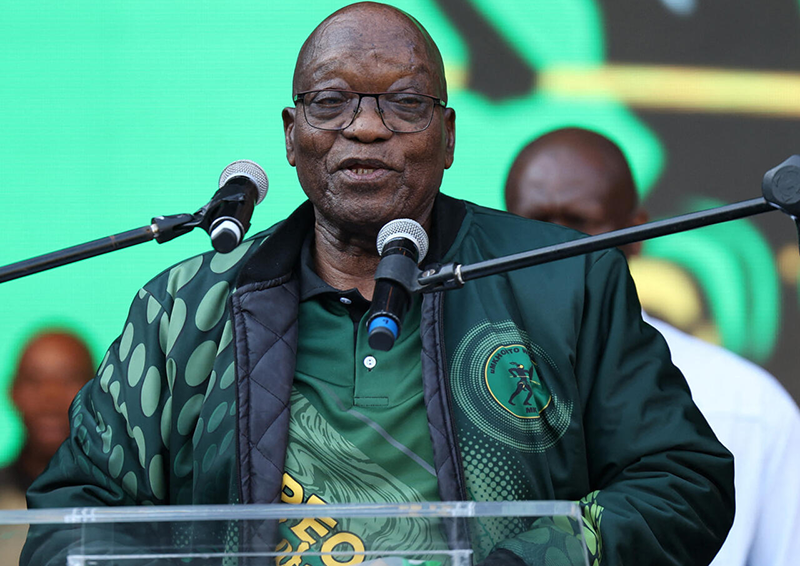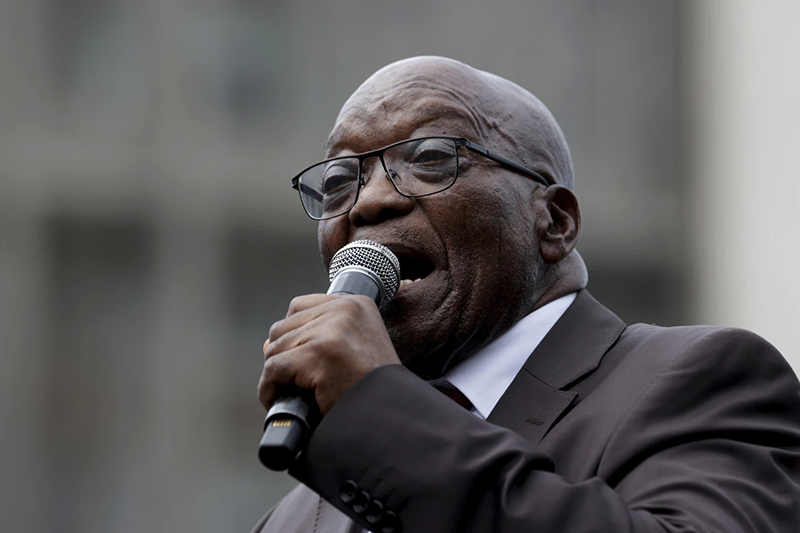- Opinion
- No Comment
Jacob Zuma remains a problem for South Africa

By Geoff Hill
More than 30 years after the Berlin Wall came down, leaders of the African National Congress (ANC), South Africa’s long-time ruling party, still refer to each other as ‘comrade’. Unless, that is, you’re seen as a problem.
‘Comrade Cyril Ramaphosa will be here,’ ANC secretary general Fikile Mbabula told journalists on Sunday morning as he explained how, around 5 p.m., the President would receive the final election results at the main counting centre between Johannesburg and the capital, Pretoria. ‘There’s nothing to celebrate in terms of performance of the ANC,’ he said.
Zuma has come away with 14.6 per cent of the vote but still claims it was rigged against him
It sounds weird referring to the billionaire Ramaphosa as ‘comrade’, as if he were some commissar from Cuba or the former Soviet Union – both of which had backed the ANC when it challenged white minority rule in South Africa. Before taking the presidency, Ramaphosa ran the McDonalds burger chain in South Africa and held shares in some of the country’s largest mining firms. A disciple of Lenin he is not.
For the ANC there was indeed ‘nothing to celebrate’ in the election. From 57 per cent of the vote five years earlier, they had crashed to just over 40 per cent, giving them perhaps 161 seats in a parliament of 400 – well short of the 201 needed to govern.
But Mbabula, a former police minister, stressed that his party had the single largest share of seats. Which is true, although close on three out of five of those who cast a ballot had chosen someone else.
The Independent Electoral Commission (IEC) ran the poll as best it could, short on staff and budget; there have been 539 objections lodged far. No surprise given that more than 40 parties had run at either the national or provincial level or both; most didn’t win a seat and some were sure to be aggrieved no matter how transparent the process.
Much of the ANC’s loss has been picked up by uMkhonto we Sizwe (MK), just six months old and led by the former president Comrade Jacob Zuma. Make that ‘former comrade’. The party now refers to him merely as ‘Zuma’ and will occasionally deign to add a Mr. The disgrace!
This is ironic because his MK party is much more Marxist in style, wanting to nationalise all land, mines and banks without compensation and largely scrap the constitution. And, of course, dismiss the dozens of cases Zuma faces in court as a result of an enquiry he set up while president which he said would clear rumours of corruption on his watch. Instead, day by day, more witnesses came forward with testimonies ranging from the odd bribe to allegations of embezzlement.
In no time, the ANC itself appeared to be in the dock. The party removed Zuma as president, replacing him with former union boss turned entrepreneur Ramaphosa.
Zuma has come away with 14.6 per cent of the vote but still claims it was rigged against him and wants a re-run. He is insisting the IEC should not declare the process over, which happens under the constitution when this politically neutral body hands the results to the president. MK and their Zulu supporters made veiled threats of carnage; in one of the world’s most violent countries, this is not taken lightly and in his speech Mbabula made clear the police and army were ready to deal with troublemakers.

Three years ago when Zuma was briefly jailed for contempt of court, riots in KwaZulu Natal (KZN) left 354 people dead and in an orgy of looting, shopping malls were burned to the ground. More than 5,000 were arrested.
On Sunday evening, dressed in a grey suit with a mulberry tie, Ramaphosa, 71, turned up as promised and received the official figures in presence of the chief justice. He kept his speech as neutral as he could, joking with the audience that he hoped he might be welcomed as ‘distinguished’ guest rather than ‘extinguished’. He then stressed that he was there not as a politician ‘but as president of the republic’.
‘Millions of South Africans have cast their votes in cities and towns, in villages and on farms, at voting stations at home and abroad.’ He said the people had taken responsibility ‘for the future of their country’. And the democracy remained ‘strong, robust and enduring’.
Then, without mentioning Zuma, he said politicians had no option but to accept that whether they like it or not, the ‘people have spoken’. Clearly, a re-run is not on the cards.
‘We must respect the wishes’ of the people he said. Then, in the spirit of the first black president, Nelson Mandela who took power 30 years ago, he reached out to this very mixed nation.
‘We must build a country which everyone black and white, men and women, young and old can call home, and this remains the defining mission.’ It must he said be ‘inclusive, united’.
He said the parties had argued, ‘often forcefully’, adding that people also had a right to expect their leaders to overcome differences and work together. ‘To find common ground and I want to underline that, for the good of everyone.’
All this, he said, must be done peacefully, within the constitution and the rule of law. And the seats the politicians occupied in parliament ‘belong not to us but to the people of South Africa’. Then, in all 11 official languages, including Zulu, English, Afrikaans and his native Venda – one of the country’s smallest ethnic groups of no more than 900,000 based along the Limpopo River – he again thanked the nation.
Ramaphosa now faces the challenge of finding political partners who will respect that the ANC has the largest number of seats while adding their own flavour to a coalition. Julius Malema and his Economic Freedom Fighters who saw their support drop below 10 per cent and who, like Zuma, want wholesale nationalisation, have insisted they take the finance portfolio. In a blend of the US and British systems, a government here can appoint ministers from among its MPs but also from outside and it is rumoured the economic ministries will go to experts from business or academia.
Mr Zuma has been barred by the courts from standing as an MP because of his past prison term and he still faces a multitude of charges in court. So why did people vote for him?
The nation as a whole did not. In seven of the nine provinces, MK wasn’t even in the top three, but in Zuma’s home region of KZN, his tally was 46 per cent. South Africa has no racial majority, but one-in-four are Zulu. The only other province where he made a showing was Mpumalanga where, in the north, the famous Kruger National Park stretches for more than 8,000 square miles. The south of Mpumalanga borders KZN and many speak Zulu.
But it was more than just the ethnic vote that speared the ANC. Millions of young people are unemployed and crime has given South Africa a murder rate higher than Haiti. After the ANC, the Democratic Alliance (DA) led by John Steenhuisen, also from KZN, took second place at 21 per cent. Like Ramaphosa, the party is pro-business but has campaigned against corruption which it says has dropped since Zuma left office, but remains a problem.
Each year, Transparency International releases an index on how corrupt a country is perceived around the world. Denmark is top of the clean list, Somalia sits at number 180 at the bottom, with Britain in 20th place and scoring the same as France. South Africa is at 83, in the bracket with Vietnam and Kosovo.
On Tuesday, Ramaphosa must give an official address to his party, but there is no indication whether, by then, he may have a coalition, let alone a cabinet. There, he and his fellow comrades must decide a way forward and, above all, what to do about ‘Mr’ Zuma.
Geoff Hill is a Zimbabwean journalist and author of The Battle for Zimbabwe. His book of short stories, Pharaoh’s Bath, will be published later this year.
